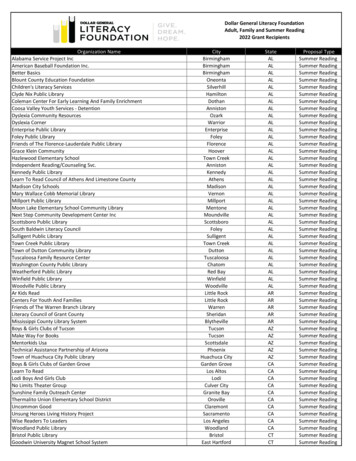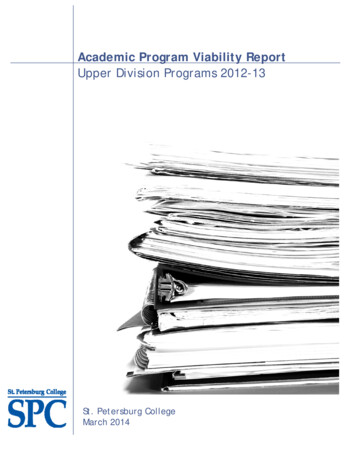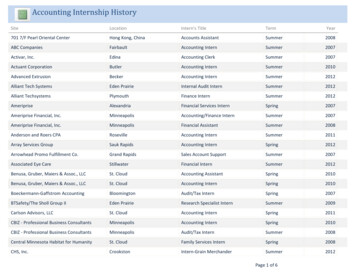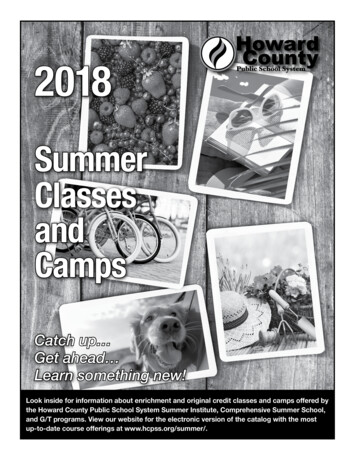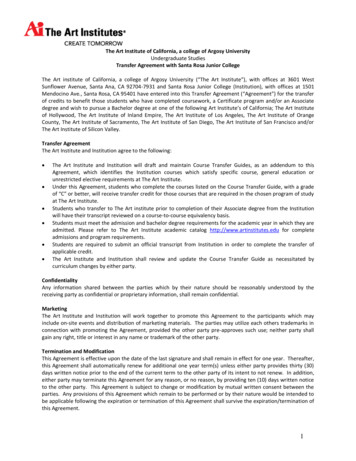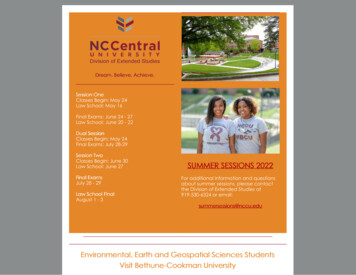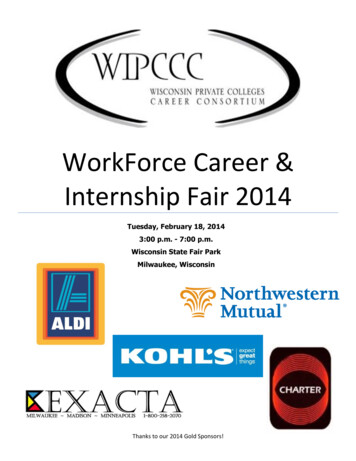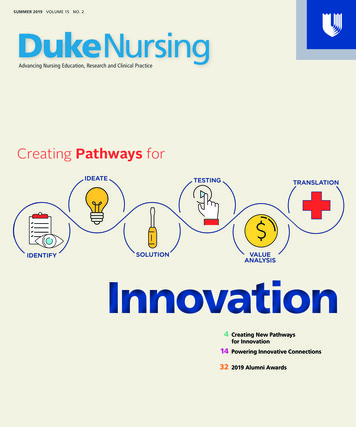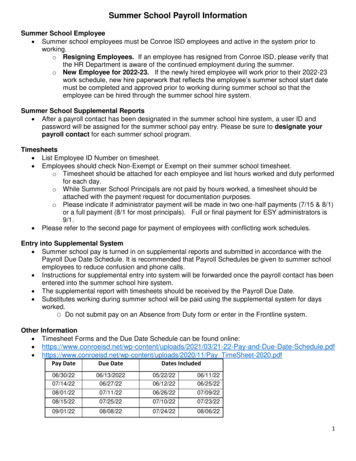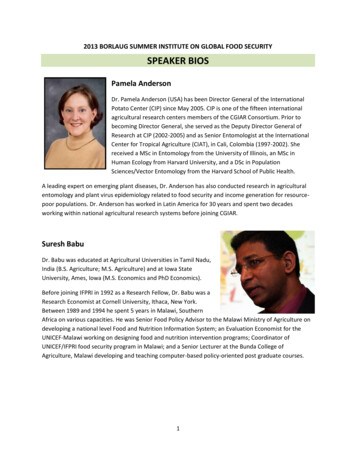
Transcription
2013 BORLAUG SUMMER INSTITUTE ON GLOBAL FOOD SECURITYSPEAKER BIOSPamela AndersonDr. Pamela Anderson (USA) has been Director General of the InternationalPotato Center (CIP) since May 2005. CIP is one of the fifteen internationalagricultural research centers members of the CGIAR Consortium. Prior tobecoming Director General, she served as the Deputy Director General ofResearch at CIP (2002-2005) and as Senior Entomologist at the InternationalCenter for Tropical Agriculture (CIAT), in Cali, Colombia (1997-2002). Shereceived a MSc in Entomology from the University of Illinois, an MSc inHuman Ecology from Harvard University, and a DSc in PopulationSciences/Vector Entomology from the Harvard School of Public Health.A leading expert on emerging plant diseases, Dr. Anderson has also conducted research in agriculturalentomology and plant virus epidemiology related to food security and income generation for resourcepoor populations. Dr. Anderson has worked in Latin America for 30 years and spent two decadesworking within national agricultural research systems before joining CGIAR.Suresh BabuDr. Babu was educated at Agricultural Universities in Tamil Nadu,India (B.S. Agriculture; M.S. Agriculture) and at Iowa StateUniversity, Ames, Iowa (M.S. Economics and PhD Economics).Before joining IFPRI in 1992 as a Research Fellow, Dr. Babu was aResearch Economist at Cornell University, Ithaca, New York.Between 1989 and 1994 he spent 5 years in Malawi, SouthernAfrica on various capacities. He was Senior Food Policy Advisor to the Malawi Ministry of Agriculture ondeveloping a national level Food and Nutrition Information System; an Evaluation Economist for theUNICEF-Malawi working on designing food and nutrition intervention programs; Coordinator ofUNICEF/IFPRI food security program in Malawi; and a Senior Lecturer at the Bunda College ofAgriculture, Malawi developing and teaching computer-based policy-oriented post graduate courses.1
Rob BertramRob Bertram is the Director of the Office of Agricultural Research and Policyin Technology in USAID's Bureau for Food Security. The office providesleadership to the Agency's investments that leverage biophysical and socialsciences and economics across the U.S. and globally, engaging the CRSPs,the CGIAR system, the private sector and USDA.Rob has been with USAID for more than 25 years and comes from a plantbreeding and genetics background with degrees from UC Davis, the University of Minnesota and theUniversity of Maryland. His office is spearheading the Feed the Future Research Strategy and is currentlyfocusing significant efforts on agriculture-nutrition linkages, sustainable intensification of productionsystems and adaptation to climate change.Dana BoggessDana Boggess is a Program Officer at the Bill & Melinda GatesFoundation, where she leads the Agricultural Developmentprogram’s work on smallholder and agricultural enterprisefinance. Her previous experience includes private sector strategyconsulting for the high-tech and telecom sectors, as well asdeveloping capacity building programs for Pact in Cambodia. Ms.Boggess holds a Master’s degree from Columbia University, whereshe focused on Economic Development and Finance.Julie BorlaugJulie Borlaug is the granddaughter of Dr. Norman E. Borlaug and the AssistantDirector of Partnerships at the Borlaug Institute for International Agricultureat Texas A&M. Since the passing of her grandfather, Julie has worked tocontinue his legacy through developing agricultural partnerships betweenpublic, private and philanthropic groups to further the Borlaug legacy andexpand upon his mission to feed the world’s hungry.Julie received her BA from Texas A&M in International Studies and PoliticalScience in 1997 and her MBA in Nonprofit Management from the Universityof Dallas in 2004. She has spent her career in the nonprofit sector and hasworked for organizations such as the Salvation Army and the AmericanCancer Society as Development Director. She has recently transitioned into her new role as AssociateDirector of External Relations in order to champion her grandfather’s legacy and lend a voice to hisdesire to see more successful collaborative partnerships between the public and private partnerships inorder to ensure the continuation of breakthroughs in international agriculture.2
Sylvie BrouderSylvie Brouder’s research addresses implications of converging U.S.biofuel and food security agendas by developing field-to-landscapeanalyses of the potential for dedicated energy crops to providerenewable fuel on marginal lands while protecting natural resourcesand food or feed productivity. She directs Purdue’s Water Quality FieldStation and is responsible for developing and promoting agro-ecologyprogramming campus-wide. A core theme of Brouder’s research andthe field station’s research portfolio is quantitative assessment ofsynergies and tradeoffs among productivity and environmental objectives to inform development ofpolicy that promotes agricultural sustainability.She specializes in crop mineral nutrition with an emphasis on crop ecology, water quality and agroecosystem nutrient balances and losses. In her research, she concentrates on nitrogen, carbon andpotassium, evaluating the practicality of systems and management practices, and ecological viability andsustainability, including influences on water quality and greenhouse gas emissions from agriculturalsoils. Brouder earned a doctorate in ecology from the University of California, Davis, and a bachelor’sdegree in biology from Harvard University.Richard BuckiusRichard Buckius was named in May 2008 as Purdue University's VicePresident for Research. This position is charged with assisting faculty andstaff in their research efforts and leading research administration andoversight, research development and proposal preparation, fundingopportunities, and private sector partnerships. Dr. Buckius has beenassistant director of the National Science Foundation's Directorate ofEngineering since 2005 and has been on leave from the University of Illinoissince 2004, when he became director of the NSF's Division of Chemical andTransport Systems. He was head of the university's Department ofMechanical and Industrial Engineering from 1998 to 2004, the Richard W.Kritzer Professor from 1992 to 1997, and associate vice chancellor for research from 1988 to 1991.Buckius' research contributions include his work to advance the fundamental knowledge in thermalsciences, specifically in the areas of radiation heat transfer, convective transport, and combustion. Hehas received numerous awards, including the Richards Memorial Award from the American Society ofMechanical Engineers in recognition of outstanding contributions to research and teaching in thethermal sciences and the Ralph Coats Roe Award from the American Society for Engineering Educationin recognition of contributions to research and teaching. He also received the Potter Gold Medal fromthe American Society of Mechanical Engineers in recognition of eminent achievement in the science ofthermodynamics in mechanical engineering.3
Gary BurniskeMr. Burniske is a specialist in international relief and development, witha technical focus on sustainable agriculture, forestry and naturalresource management. He is the Managing Director of the Center forGlobal Food Security within Discovery Park at Purdue University. Mr.Burniske is responsible for the day to day management of the Centerand networks with Purdue’s faculty and scientists to take a multidisciplinary approach to tackling global challenges affecting foodsecurity.Prior to joining Purdue, Mr. Burniske held senior leadership positionswith prominent international organizations such as Mercy Corps, CARE, Institute for SustainableCommunities, International Tropical Timber Organization and Rainforest Foundation International.Most recently, he led Mercy Corps flagship country offices for nearly 10 years, serving as CountryDirector in Tajikistan and Colombia. One of Mr. Burniske’s most noted accomplishments include thetransformation of a small local Tajik NGO, the National Association of Business Women into the largestmicrocredit provider in Tajikistan, IMON International with a 30 million portfolio serving 27,000borrowers.Mr. Burniske holds an MS in Forest Economics and a BS in Natural Resources Management, both fromthe University of Massachusetts. He is fluent in Spanish, Russian, Thai and Arabic, and conversational inPortuguese.Indrajeet ChaubeyDr. Indrajeet Chaubey is a Professor of Ecohydrology with jointappointments in the Department of Agricultural and BiologicalEngineering, Department of Earth, Atmospheric, and Planetary Sciences,and the Division of Environmental and Ecological Engineering. He recieved aB.S. in Agricultural Engineering from the Allahabad AgriculturalInstitute (India); M.S. in Agricultural Engineering from the University ofArkansas; and a Ph.D. in Biosystems Engineering from the Oklahoma StateUniversity. Before joining Purdue University in 2007, he was a faculty at theUniversity of Arkansas where he served as Assistant Professor from 2000 to2005, and Associate Professor with tenure from 2005 to 2006.Dr. Chaubey's research integrates field data collection with simulation-based engineering andcomputational thinking to advance our understanding of fate and transport of water and relatedconstituents across a wide range of spatial and temporal scales. Specifically, he is interested inecohydrologic processes affecting fate and transport of sediment, nutrients, and pesticides from variousland use activities and developing watershed management strategies to improve water quality.4
Melba CrawfordMelba Crawford is a Professor of Civil and Electrical Engineering andAgronomy at Purdue University and serves as the Associate Dean forResearch in the College of Engineering. Previously, she was a facultymember at the University of Texas at Austin, where she founded aninterdisciplinary research and applications development program in remotesensing. Her current research program focuses on pattern recognition,active learning, and sensor fusion. She received BS and MS degrees fromUniversity of Illinois and a PhD from Ohio State University.Dr. Crawford was a Jefferson Senior Science Fellow at the U.S. Departmentof State, a member of the NASA Earth System Science and Applications Advisory Committee, the NASAEO-1 Science Validation team, and an advisory committee for the IEEE Committee on Earth Observationto the South African Department of Science and Technology. Dr. Crawford is a Fellow of the IEEE.Lisa EakmanLisa Eakman is the Executive Director for Global Agriculture & FoodInitiative in the Chicago Council on Global Affairs since 2011. In thepast she worked as Director for Global Agriculture for the ChicagoCouncil and Senior Program Officer for the same institution. Sheobtained her B.A. in International Studies, Political Science and Spanishat Bradley University; and got her M.A. in Security Policy Studies at TheGeorge Washington University.Gebisa EjetaGebisa Ejeta is the Distinguished Professor of Plant Breeding & Genetics andInternational Agriculture at Purdue University and the Executive Director ofthe Purdue Center for Global Food Security. He completed his earlyeducation in his native country of Ethiopia, including a BS in Plant Sciencesfrom Alemaya College in 1973. He attended graduate school at PurdueUniversity earning his Masters (1976) and PhD (1978) in Plant Breeding &Genetics. In March 1979, Gebisa joined the International Crop ResearchInstitute for the Semi-arid Tropics (ICRISAT) and conducted seminal sorghumresearch in Sudan for five years. In January 1984, Dr. Ejeta returned toPurdue University as an Assistant Professor in the Department of Agronomy. Since then, he has led acomprehensive educational and research program at Purdue with emphasis on African agriculturalresearch and development.5
Dr. Ejeta serves on the Board for International Food and Agricultural Development, the ConsortiumBoard of the Consultative Group for International Agricultural Research, the Sasakawa AfricaAssociation, and the Chicago Council for Global Affairs Agricultural Development Program. He is aFellow of the American Association of the Advancement of Sciences, the Crop Science Society ofAgronomy, and the American Society of Agronomy. He was a member of the team that launched theAlliance for Green Revolution in Africa, a joint effort of the Rockefeller and Gates Foundation.Among his many awards, Gebisa Ejeta was the recipient of the 2009 World Food Prize; and a nationalmedal of honor from the President of Ethiopia.Sofia FengSofia Feng is a PhD. student in Food Science and Nutrition working under Dr. JonAllen at NC State University. Sofia arrived at Raleigh, NC with a Fulbright fellowship,to pursue her Masters in 2011. Since then she has been working in Sweet PotatoFlour Fortification and Micronutrient Additives Enhancement. She considers theSummer Institute on Global Food Security, 2012, one of the most remarkablemoments during her graduate studies, where she was a participant. She completedher early education in her native country of Costa Rica, including a bachelor's degree from University ofCosta Rica. Currently, she serves as the President of the Fulbright Student Association at NC State,where she enjoys sharing her experiences with other international and US Fulbrighters.Mario FerruziDr. Ferruzzi’s long-term goal is to identify food science strategies that willcontribute to the prevention of chronic disease in humans. Working towardthis goal his research program has focused on the investigation of how thefood matrix and processing impact phytochemical physical and chemicalstability, and bioavailability with a particular focus on polyphenols andnatural pigments (carotenoids and chlorophylls). Dr. Ferruzzi’s researchaddresses both fundamental and applied questions critical to food industryincluding: (1) Development of methods for determination ofphytochemicals in complex matrices; (2) Assessment of phytochemicalstability and reactivity in food systems; (3) Exploring of factors impacting phytochemical bioavailabilityfrom foods; and (4) Development of strategies for incorporation/stabilization of phytochemicals in foodsystems. He received his BS at Duke University and his MS and PhD at The Ohio State University.6
Joan R. FultonDr. Fulton is a professor in Purdue’s MS/MBA program. Dr. Fulton is active inExtension programming. She is Chair of Purdue’s New Ventures Team andDirector of Purdue’s Agricultural Innovation and Commercialization Center(AICC) where she is active in the development and delivery of programs toassist individuals and groups evaluate new business opportunities. Herresearch focuses on problems related to marketing and business structureboth in the United States and internationally. Her recent work examinedword-of-mouth marketing among farmers in the United States. In WestAfrica she has explored the importance of alternative extensionprogramming for technology transfer and adoption of improved technologies. She is currently examiningthe factors that contribute to successful entrepreneurship for women selling street food in West Africaand other developing countries. Dr. Joan Fulton joined the Purdue Agricultural Economics faculty in July1997. She received a bachelors degree from University of Saskatchwan, a masters degree fromUniversity of Western Ontario and a doctorate from University of Minnesota.Jay P. GoreDr. Jay P. Gore is the Vincent P. Reilly Professor in Mechanical Engineering and aJefferson Science Fellow at the US Department of State. He is the formerDirector of the Energy Center in Discovery Park. He served as a Research Fellowin Aerospace Engineering at the University of Michigan and as an AssistantProfessor of Mechanical Engineering at the University of Maryland prior tojoining Purdue as an Associate Professor. Jay is a past Chairman of the CentralStates Section of the International Combustion Institute and the ASME K11 Committee on Heat Transferin Fire and Combustion. He has served as an Associate Editor of the ASME Journal of Heat Transfer. Hewas the U.S. Editor of the 28th International Combustion Symposium. Dr. Gore currently serves as anAssociate Editor of the AIAA Journal.Jay's research is in the area of combustion and radiation heat transfer with applications to pollutantreduction, efficiency enhancements, fire safety, and improved fundamental understanding. He hasreceived over 10M in research funding and is currently serving as the PI for grants over 1M in gasturbine combustion and radiation heat transfer applications. He has authored or coauthored over 100archival papers, 4 book chapters, and 175 conference papers. Jay has developed/revised 2 courses(Combustion and Advanced Combustion) at Purdue University and three courses in heat transfer andthermodynamics at the University of Maryland. He received a bachelor’s degree from University ofPoona, and masters and doctorate degrees from Penn State.7
Steve HalletIn Dr. Hallett's book, Life without Oil, he explains that we must plan for afuture without reliance on oil and shift to a new energy future by adoptinga wiser, more sustainable stewardship of our natural resources. Dr.Hallett’s research interests are in the broad area of the ecology of plantpathogen interactions.His applied research targets the development of bioherbicides for weedcontrol and studies the mechanisms of herbicide resistance while his basicresearch studies the ecology of the interactions between weeds and soilmicrobial communities in agricultural and natural systems. In 2002 Dr.Hallet received the “Award of excellence” from the Weed Science Society of America. He received a BScand PhD from Lancaster University.Thomas HertelProfessor Hertel is Distinguished Professor of Agricultural Economics at PurdueUniversity, where his research focuses on the economy-wide impacts of globaltrade and environmental policies. Dr. Hertel is a Fellow, and Past-President, ofthe Agricultural and Applied Economics Association (AAEA). He is also thefounder and Executive Director of the Global Trade Analysis Project (GTAP)which now encompasses more than 10,000 researchers in 150 countriesaround the world (http://www.gtap.agecon.purdue.edu/). This Projectmaintains a global economic data base and an applied general equilibriummodeling framework which are documented in the book: Global TradeAnalysis: Modeling and Applications, edited by Dr. Hertel, and published by Cambridge University Pressin 1997.Professor Hertel’s most recent research has focused on the impacts of climate change and mitigationpolicies on global land use and poverty. During the 2011-12 year he was on leave at Stanford University,where he was engaged in inter-disciplinary research on these topics. Previously, Professor Hertel hasconducted extensive research on the impacts of multilateral trade agreements, including the linkagesbetween global trade policies and poverty in developing countries. His book on the poverty impacts of aWTO agreement (co-edited with Alan Winters) received the AAEA Quality of Communication award.Other AAEA awards include: Distinguished Policy Contribution and Outstanding Journal Article. Hereceived a bachelors degree from University of North Carolina at Chapel Hill, a masters degree fromWoodrow Wilson School, Princeton University, and a doctorate from Cornell University.8
Matthew HuberDr. Matthew Huber is a Professor of Earth and AtmosphericScience. He is a Co-founder and Member Purdue ClimateChange Research Center. He is the head of the ClimateDynamics Prediction Laboratory. His research and that of theCDPL is focused on past, present and future climate, themechanisms that govern climate, the different forms thatclimates can take on Earth, and the relationship betweenclimate change and life. Major research areas include the radiative and dynamical processes generatingtropical ‘thermostats’, and polar amplification of warming, as well as the ecological and evolutionaryimplications of these processes and patterns.He has won numerous awards and accolades including the IBM Scholars Program for Linux Award. He isthe Fmr. Co-Chair of the NCAR CCSM Paleoclimate Working Group, Fmr. Associate Editor ofPaleoceanography, and is Currently Topical Editor of EGU Journal, “Earth System Dynamics.He received a Bachelors from the University of Chicago in Geophysics, a Masters from the University ofCalifornia Los Angeles in Atmospheric Sciences, and a Ph.D. from the University of California Santa Cruzin Earth Sciences.Kevin KeenerDr. Keener’s main interests consists in applying engineeringprinciples to improve production efficiencies, enhance quality,and reduce waste in an overall effort to promote economicallysustainable practices in the production of food, pharmaceutical,and biological products and educating students and industrypersonnel on applying engineering principles to solve problems infood, pharmaceutical, and biological systems. He obtained his B.S. and M.S both in agriculturalengineering from Ohio State University, and then got his Ph.D. in Food Process Engineering from PurdueUniversity. He is currently a professor in the Food Science Department at Purdue University.Jess Lowenberg-DeBoerJess Lowenberg-DeBoer is professor in the Department of Agricultural Economicsand Associate Dean and Director of International Programs in Agriculture (IPIA) atPurdue University. His research focuses on agricultural production economics,including soil fertility management, cropping systems, technology adoption, riskmanagement and financing. Since 1997 he has been West Africa facilitator forthe USAID Bean/Cowpea Collaborative Research Support Program (CRSP)9
working to build multidisciplinary teams and supervising CRSP social science research.Lowenberg-DeBoer has a Master’s degree in Agricultural Economics from Cornell University, Ithaca, NewYork, and a Ph.D. in Economics from Iowa State University, Ames. He joined the Purdue faculty in 1985,dividing his time between the West Lafayette campus and Purdue activities in West Africa. He returnedin 1992 from a four year tour of duty in the Republic of Niger, West Africa, where he served aseconomist and team leader for a Purdue University project. He brings to his research and teaching aperspective gained through private sector experience as farmer and journalist western Iowa.Chad MartinChad Martin is the Renewable Energy Extension Specialist in Agriculturaland Biological Engineering at Purdue University. He earned an A.A.S.degree in Agriculture Business from Joliet Junior College, Illinois; a B.S.degree in Agriculture Education from Western Illinois University atMacomb, IL; and an M.S. in Agricultural & Extension Education fromPurdue University. His background in renewable energy began whileworking as a research and outreach associate with the Illinois Institutefor Rural Affairs at Western Illinois University. He worked specificallywith the Agriculture Community Action Program which helped organize New Generation Cooperativesfor capitalizing biofuels production operations with farmer and local ownership throughout rural Illinois,and provided support to the IIRA's Illinois Wind project. Before coming to Purdue, he was the businessdevelopment specialist with the Indiana Cooperative Development Center in Indianapolis. Martinfocuses his Extension efforts in the areas of on-farm energy efficiency, biomass energy resources, andwind energy. He works with producers, small businesses, Purdue faculty and Extension educators, andstate and federal government agencies to deliver programs. He is a member of the Indiana WindWorking Group, and along with Purdue faculty has initiated the Indiana Biomass Energy Working Group.He provides presentations to diverse groups and coordinates the development of educational resources.Maureen McCannMaureen McCann is a professor and assistant head of biological sciencesat Purdue University. She is also Director of the Energy Center at PurdueUniversity. Dr. McCann is internationally recognized for her work on themolecular architecture of cell walls and pioneering use of enablingtechnologies for direct imaging of wall structure, mapping biomassheterogeneity, and use of novel spectroscopic screens for cell wallmutants with over 80 published journal articles. Recently, she hasidentified several novel gene families that impact the growth of plants inArabidopsis. Her model of the dicot cell wall is widely cited and served asa template in the DOE-GTL Research Roadmap to Breaking the Biological Barriers to Cellulosic Ethanol(2005). She is an active member of the Midwest Bioenergy Center. Her current research focus is on thearchitecture of lignocellulosic biomass and gene discovery in maize for translation to other bioenergy10
species. Her contributions to the project will be in the genetic and phenotypic analyses of the maizelines, and as an expert in cell wall architecture. Dr. McCann leads an interdisciplinary team of biologists,chemists and chemical engineers in a DOE-funded Energy Frontier Research Center focused ondeveloping technologies for the direct catalytic conversion of biomass to biofuels (C3Bio). She received aPhD from University of East Anglia.Philip E. NelsonDr. Philip E. Nelson, Professor Emeritus at Purdue University, was awardedthe 2007 World Food Prize for his innovative breakthrough technologieswhich have revolutionized the food industry, particularly in the area of largescale storage and transportation of fresh fruit and vegetables using bulkaseptic food processing. An icon of the food world, Dr. Nelson’s discoverieshave made major contributions to the availability of nutritious foodsworldwide. Commonly credited for recognizing the untapped potential ofaseptic technologies for much larger scale applications, the aseptic bulkprocessing and packaging technology pioneered by Nelson can be found inalmost every country in the world.Bryan PijanowskDr. Pijanowski’s main interests are the impacts of land useand climate change on ecosystem services. His expertise is inthe development of spatial-temporal simulation models thatattempt to characterize how human activities impactlandscape structure and function. He is also interested incomplex socio-ecological systems and how theoreticalframeworks can be used to study land-climate-hydrologicalsystems around the world. Dr Pijanowsky is a co-PI on theClimate-Land Interaction Project funded by the NSF Biocomplexity in the Environment program. Thework focuses on land use and climate change at local to regional scales in East Africa. He is a professor inPurdue Department of Forestry and Natural Resources. He recevied his Ph.D. in zoology from MichiganState University.Leigh RaymondLeigh Raymond is a Professor of Political Science at Purdue University and afounding member and Director of the Purdue Climate Change ResearchCenter. He received his M.S. and Ph.D. in Environmental Science, Policy, andManagement from U.C. Berkeley, and a B.A. in Philosophy from YaleUniversity. Prior to his arrival at Purdue in 2002, he taught for two years as aLecturer in Environmental Studies at the University of Chicago.11
Dr. Raymond's research focuses on the role of norms and values in shaping political behavior and policyoutcomes, especially in contrast to economic motivations. His primary focus has been on norms andvalues related to property rights as they affect market-based policies for environmental protection,including emissions trading, as considered in detail in his 2003 book Private Rights in PublicResources. Recently, he has completed two multi-year NSF-funded studies of state environmentalpolicies, one addressing the role of norms of precaution on policies toward environmental risk, the otheron how moral and other frames influence state policies related to renewable fuels. He is currentlyconducting research on the role of economic versus and non-economic frames in shaping farmerinterest in conservation tillage, and a project on framing climate science. He is also at work on a newbook on recent developments in emissions trading policy.Paul E. SchicklerPaul E. Schickler is president of DuPont Pioneer, the advanced seed geneticsbusiness of DuPont. In this role, which he has held since 2007, he hascontinued to expand Pioneer’s global business by remaining focused oninnovation that improves local productivity and profitability of farmers inmore than 90 countries. Since joining Pioneer in 1974, Schickler has served ina variety of finance and administrative leadership roles throughout thebusiness, including vice president of International Operations from 1999 to2007. He currently serves on the DuPont Committee on AgriculturalInnovation and Productivity in the 21st Century and the DuPont AgricultureDecision Board, and is a member of the DuPont Operating Team.Schickler is a graduate of Drake University, where he received bachelor of science and master of artsdegrees in business administration. He currently serves on The Chicago Council on Global Affairs boardof directors, The Chicago Council’s Global Agricultural Development Initiative Advisory Group, the GrandView University board of directors and the Iowa Business Council. A strong contributor to thecommunity, Schickler is an active supporter for United Way, The World Food Prize Foundation, Mealsfrom the Heartland and the Farm Journal Legacy Project.Darrell SchulzeDarrell Schulze is a Professor of Soil Science in the Agronomy Department atPurdue University where he joined the faculty in 1982. He has Bachelors andMasters degrees in Agronomy and Soil Science from Texas A&M Universityand a Ph.D. in Soil Science from the Technical University of Munich. Hiscurrent research interests are in quantifying how differences in soils andlandscapes impact the livelihoods of small holder farmers in East Africa,specifically Kenya and Uganda. The Soils and Landscapes class tha
University, Ames, Iowa (M.S. Economics and PhD Economics). Before joining IFPRI in 1992 as a Research Fellow, Dr. Babu was a Research Economist at Cornell University, Ithaca, New York. Between 1989 and 1994 he spent 5 years in Malawi, Southern Africa on various capacities. He was Senior Food Policy Advisor to the Malawi Ministry of Agriculture on
